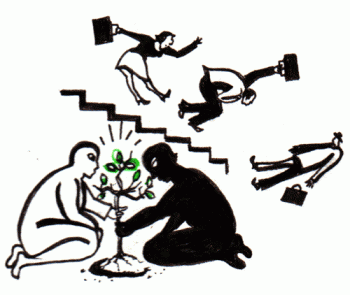Aboriginal Justice is Up to All of Us

Government funding of Indigenous communities is the opposite of the value chain of production. It is an anti-value chain of production. . For every one of our half a million Indigenous Australians, there are dozens of lawyers, bureaucrats, contract managers, politicians, chiselers trying to work out an angle. Even those who work with benevolent intentions are being paid fine salaries but very few ask themselves: what value have I created for Indigenous communities and people on the ground today? As a result per capita funding on Indigenous affairs increases, but economic disadvantage and health inequality of Indigenous Australians worsens. It’s a perfect game. The Aboriginal Industry excels at producing more statistics, indulging in more meetings, more flights around the country, creating more blockages and dysfunction and no practical action.
The situation of failed government across the country could not be more tragic for Aboriginal people because we in the private sector have an even worse record. In 2009 our national prosperity, and our capacity to withstand the global economic meltdown is propped up by mining companies earning tens of billions a year who have never paid fair rent to Indigenous land holders. These communities still live in scandalous, abject poverty. We in NSW owe as much as anyone else does. The viability of our south eastern state economies is increasingly propped up by those industries, not to mention the historical exploitation of Indigenous land and natural capital from our own State. Even after Mabo, in Noel Pearson’s famous words Australian native title is a situation where “the whitefellas get to keep everything they have accumulated, the blackfellas should now belatedly be entitled to whatever is left over.”
In a just world, the original landholders would be at the top of our economy, but Indigenous Australians are at the bottom of world poverty indexes. Can Australians create real social, economic or cultural step ladders for Aboriginal people? This is not about reconciliation. What does reconciliation mean in such a context? Are we reconciling gross economic exploitation and injustice? This is about the transfer of wealth, knowledge, power and capacity, if any just equilibrium is to be reached. To be effective the process must be driven by us as private individuals. We must give up the best we have to support Aboriginal Australians reach our higher standard of living. Would this be painful? to the contrary it would make us stronger, prouder, happier people.
Peter Botsman is the voluntary secretary of the Indigenous Stock Exchange: www.isx.org.au He works pro bono for Aboriginal communities for six months of the year.


